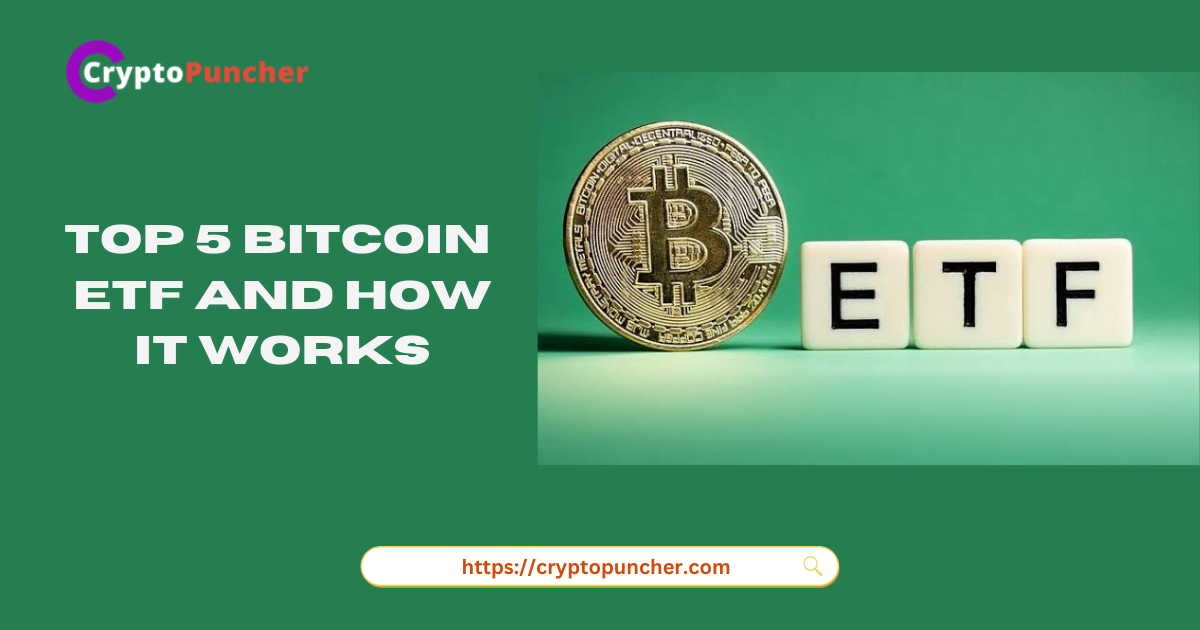Last updated on January 14th, 2025 at 05:33 pm
There’s a need to consider the top 5 Bitcoin ETFs and how they work to influence trading Bitcoin-related assets on brokerage without investors owning any cryptocurrencies.
Can this be possible?
Yes, of course, Bitcoin exchange-traded funds made it possible by offering a series of Bitcoin assets on the traditional system to individuals. This has exposed investors to Bitcoin price movement through future contracts, and fund managers are involved in purchasing these contracts and bundling them into the funds. In this article, we will explore them all.
Concept behind Bitcoin ETF
Exchange-traded funds offer assets and security on the stock market with advanced exposure to various Bitcoin assets and seamless access to buy and sell shares throughout day trading at specified prices. EFT offers investors opportunities to own shares of one ETF in different companies.
Future contracts are contracts where two parties agree to exchange a specific quantity of standardized assets within 24 hours for a certain price. With the Bitcoin futures contract, investors can trade on the Chicago Mercantile exchange. The purchase of future contracts from the CME Group and compiling them into a fund can lead to the creation of an ETF. Then the future contracts in the funds are managed while the shares are traded to gain exposure.
Types of Bitcoin ETF
There are two types of Bitcoin ETF namely spot and future Bitcoin ETF.
Spot Bitcoin provides investors with direct access to exposure to the latest market price of Bitcoin that’s why it’s called “spot” which indicates the immediate price of assets. Future Bitcoin ETF doesn’t hold actual Bitcoin assets but uses Bitcoin’s future contract to gain exposure in the crypto space through betting and speculation of the future price of the assets.
Challenges Faced By Bitcoin ETF
Bitcoin ETF is faced with a lot of policy and regulatory sanctions across the globe and this has halted it wider adoption. Notably, vanguard recently banned the trading of newly approved Bitcoin ETFs claiming it does not align with their value. This has caused controversy among investors with multiple angry holders reporting error messages while trying to access the Bitcoin exposure and this has led to the transfer of their funds to other platforms.
This move has restricted investor’s exposure to spot ETF and inability to trade assets. With this decision, investors are a bit skeptical considering the security claim of Vanguard as to the reason why they stopped the spot ETF trading. This can have an advanced effect on the wider acceptance of Bitcoin ETF.
Top 5 Bitcoin ETF and how it works
1. Fidelity BTC
Annual fee: 0.25% (after waiver expires)
Average daily trading volume: 10 million
shares Assets invested: $7 billion
Fidelity BTC is a trusted assets management company with over 401K plan providers. Fidelity launched its cryptocurrency exchange in 2023 and started trading in 2024, although it has a short span of experience and an annual expense ratio of 0.25% without waiver fees, I think fidelity can be considered given its vast experience in the investment industry.
2. iShare Bitcoin Trust
Annual fee: 0.25% (after the waiver expires)
Average daily trading volume: 27 million
shares Assets invested: $11 billion
iShare Bitcoin trust is a leading asset management with large Bitcoin funds of over $2 billion from investors of assets under management in just a short time and it’s considered to be among the first to be approved by SEC. iShare is a top ETF provider with affordable options by waiving half of 0.25% management fees or $2.5 in annual fees for every $1000 invested to just 0.12%.
3. Grayscale Bitcoin Trust ETF
The Grayscale Bitcoin Trust (GBTC), originally launched in 2013 as a trust accessible to accredited investors, transitioned into a spot Bitcoin ETF in January 2024 following SEC approval. This shift allowed GBTC to trade on the NYSE Arca, offering investors seamless access to Bitcoin exposure via traditional brokerage platforms without the need to hold the cryptocurrency directly. The ETF charges an annual management fee of 1.5% to cover expenses related to administration and safekeeping of the Bitcoin it holds.
This move was significant for the crypto investment space, as GBTC became one of the first U.S. spot Bitcoin ETFs, tracking the CoinDesk Bitcoin Price Index for pricing.
Although Grayscale Bitcoin trust charges a hefty 1.5% annual fee, or $15 for every $1000 invested every year. Grayscale Bitcoin fund is a top consideration if you want a product that follows Bitcoin price changes without buying the assets.
4. ARK 21Shares Bitcoin ETF
Ark 21Share Bitcoin was created by an innovative and disruptive technology guru called Cathie Wood’s Ark Invest with one of the lowest expense ratios at 0.21% per year with waiving fees until July 2024 or when funds assets reach $ 1 billion. With the recent collection of investor assets over $600 million in January 2024, it wouldn’t be long before they start collecting waiver fees.
5. Invesco Galaxy Bitcoin ETF
Invesco is a giant assets manager in partnership with a cryptocurrency company called Galaxy Assets Management to secure Bitcoin assets in direct custody and waive 0.39% annual fees for the first six months (until July 2024) to obtain more investor funds.
Conclusion
Bitcoin ETF provides investors opportunities to invest directly in cryptocurrency to gain exposure and sometimes lucrative assets. You can get more information from their official exchanges.
FAQ
Has a bitcoin ETF been approved in the US?
Yes, the SEC has approved both bitcoin futures ETFs and spot bitcoin ETFs in the U.S. The ProShares Bitcoin Strategy ETF, a bitcoin futures ETF, was approved on Oct. 19, 2021.
What do the approvals of Bitcoin ETF mean for Bitcoin?
Peter Eberle, the chief investment officer of California-based crypto investment firm Castle Funds, said in an email interview that the approval would have a positive impact on the price of bitcoin.
What are the advantages of investing in Bitcoin ETFs?
Investing in Bitcoin ETFs offers benefits such as simplified access to Bitcoin, regulatory oversight, reduced risks associated with direct cryptocurrency storage, and the ability to trade Bitcoin like a stock. These features make Bitcoin ETFs an attractive option for both novice and experienced investors seeking exposure to the crypto market.




